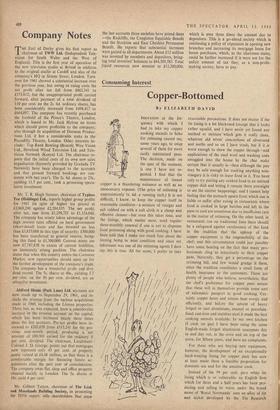Company Notes
fr HE Earl of Derby gives his first report as 1 chairman of TWVV Ltd. (Independent Tele- vision for South Wales and the West of England). This is the first year of operation of the new television studio at Bristol in addition to the original studio at Cardiff and also of the company's HQ in Sloane Street, London. Turn- over for 1961 showed a substantial increase over the previous year, but owing to rising costs the net profit after tax fell from £662,341 to £575,612; but the unappropriated profit carried forward, after payment of a total dividend of 110 per cent. on the 2s. 6d. ordinary shares, has been considerably increased from £498,417 to £664,097. The company has recently purchased the freehold of the Prince's Theatre, London, Much is leased to Mr. Jack Hylton on terms which should prove profitable to the company; also through its acquisition of Dorman Produc- tions Ltd. it has a considerable stake in the Piccadilly Theatre, London. Other interests in- clude: Top Rank Bowling (Bristol), Wire Vision Ltd., Hereford Wired Television Ltd. and Tele- vision Network (Kenya) Ltd. The chairman re- ports that the initial costs of its own new sales Organisation (formerly provided by Granada TV Network) have been charged to the accounts and that present forward bookings are con- sistent with last year's. The 2s. 6d. shares at 23s., yielding 11.7 per cent., look a promising specu- lative investment.
Mr. T. R. Hugh Sumner, chairman of Typhoo Tea (Holdings) Ltd., reports higher group profits for 1961 (in spite of higher tea prices) at £2,869,290 against £2,584,935. The net profit, after tax, rose from £1,298,721 to £1,334,040. The company has wisely taken advantage of the high interest rates offered on local government (short-dated) loans and has invested no less than £3,835,000 in this type of security; £500,000 has been transferred to general reserve, bring- ing this fund to £1,500,000. Current assets are now £7,787,838 in excess of curretit liabilities, an immensely strong position. The chairman states that when this country enters the Common Market, new opportunities should open up for the further development of the company's trade. The company has a wonderful profit and divi- dend record. The 5s. shares at 40s., yielding 3.7 per cent. on the 30 per cent. dividend, are an attractive investment.
• Aldford House (Park Lane) Ltd. accounts are now made up to September 29, 1961, and in- clude the revenue from the various acquisitions made in 1960, including the Litman properties. There has, as was expected, been a considerable increase in the revenue account on the capital, which has been increased nearly three times since the last accounts. Pre-tax profits have in- Creased to £203,658 from £113,241 for the pre- vious nine-month period, Producing a net amount of £88,901 earned for the ordinary 8 per cent. dividend. The chairman, Lieutenant- Colonel J. D. George, points out that mortgages now represent only 43 per cent, of property assets valued at £4.48 million, so that there is a comfortable margin for financing future ac- quisitions after the past year of consolidation.
The company owns flat, shop and office property situated mainly in London. The 5s. shares at 10s. yield 4 per cent.
Mr. Gilbert Tatton, chairman of The Leek and Moorlands Building Society, in presenting the 105th report, tells shareholders that since the last accounts three societies have joined them —the Radcliffe, the Congleton Equitable Benefit and the Stockton and East Cheshire Permanent Benefit. He reports that substantial increases were gained in all departments. About £12 million was invested by members and depositors, bring- ing total investors' balances to £64,569,583. Total liquid resources now amount to £11,300,000, which is over three times the amount due to depositors. This is a go-ahead society which is continuing a policy of expansion in opening new branches and increasing its mortgage loans for house purchases, which, as the chairman states, could be further increased if it were not for the unfair amount of tax they, as a non-profit- making society, have to pay.


































 Previous page
Previous page